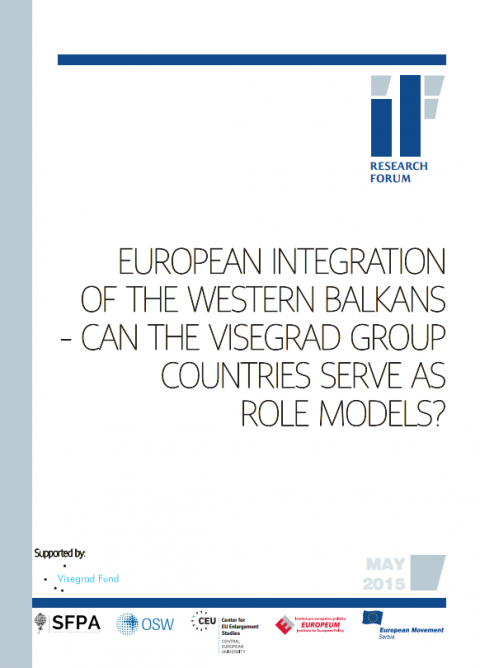Final study of the project "European Integration of the Western Balkans - Can the Visegrad Group Countries Serve as Role Models?"

The Center for EU Enlargement Studies (CENS) was taking part in the project entitled "European Integration of the Western Balkans - Can the Visegrad Group of Countries be a role model?” financially supported by the International Visegrad Fund (IVF) and led by the European Movement in Serbia (EMinS). The V4 partners on the project were the Center for EU Enlargement Studies (CENS), the Research Centre of the Slovak Foreign Policy Association (RC SFPA), the Institute for European Policy (EUROPEUM) and the Centre for Eastern Studies (OSW).
The final outcome of the project is the study which identifies practical lessons for Serbia and other Western Balkan countries that could make the EU enlargement process towards this region faster and more efficient. The papers from the four “new” EU member countries (the Czech Republic, Hungary, Poland and Slovakia) and one candidate country (Serbia) deal with the results of the great EU expansion in 2004 and its impact on internal reforms in the Visegrad Group countries (V4), as well as related adjustments within the EU.
The balance of enlargement/accession for the V4 countries (successes and failures) is examined by each think tank organization. They provided five overviews of the results achieved in: 1) the field of foreign and security policy, 2) functioning of democratic institutions and the public administration reform, 3) use of EU funds, with the impact on functioning of their economies and social systems, and 4) importance of regional structures during and after the EU accession.
Achievements of the V4 countries in these areas since joining the EU have been an important incentive both for the Western Balkan countries and the EU in justifying further enlargement efforts, but also in identifying key strengths and weaknesses of the process. It was examined which interest groups were the main carriers of the integration processes, as well as what kind of political and institutional support they had. The same analytical procedure was used to determine the current position of Serbia, the progress which has been made, the biggest laggings, the sources of support, as well as the deceleration in the reform and European integration process. Each analysis includes recommendations to Serbia and WB countries in the proposed areas.
Please, find the summary and the full study below.
